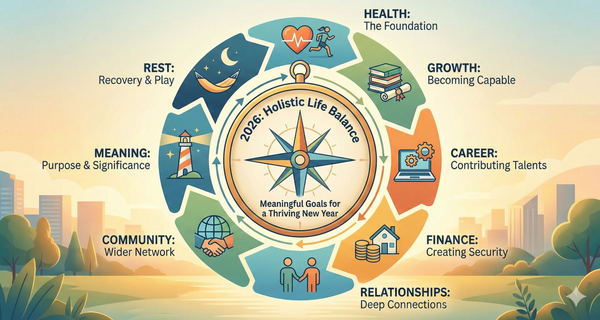What Gives Your Life Meaning?
What Gives Your Life Meaning?
In the quiet moments of our lives, between the relentless demands of work, family, and daily routines, a profound question often surfaces: "What is this all for?" This isn't just a fleeting thought; it is the echo of a deep, universal human craving for meaning. While we often equate a good life with a happy one, the pursuit of happiness alone can feel like chasing a horizon that constantly recedes. A meaningful life, however, offers something more substantial—a sense of purpose, coherence, and significance that anchors us even in turbulent times. This article will guide you through understanding the nature of meaning, exploring its foundational pillars, and providing practical steps to cultivate it in your own life.
What is 'Meaning' and Why Do We Crave It?
Before embarking on the journey to find meaning, we must first understand what it is. Meaning, in a psychological and philosophical sense, refers to the feeling that our lives matter, that they make sense, and that they are driven by a valued purpose. It is the antithesis of nihilism and despair. Our craving for it is a fundamental aspect of the human condition, a need as vital as food and shelter for our psychological well-being.
The Emptiness of Chasing Happiness Alone
Modern culture often promotes happiness as the ultimate life goal. We are encouraged to seek pleasure, avoid pain, and accumulate positive experiences. While happiness is wonderful, it is often a temporary emotional state dependent on external circumstances. A life dedicated solely to chasing these fleeting moments can lead to a "hedonic treadmill," where we constantly need a new experience to feel good, leaving us feeling empty when the novelty fades. Meaning, by contrast, is a more robust and enduring quality that can sustain us through both good times and bad.
The Frankl Perspective: Finding Meaning in All Circumstances
Psychiatrist and Holocaust survivor Viktor Frankl, in his seminal work "Man's Search for Meaning," argued that the primary drive in humans is not pleasure but the pursuit of what we find meaningful. From his observations in the most horrific conditions imaginable, Frankl concluded that even in the face of immense suffering, life can have meaning. The crucial factor is our ability to choose our attitude and to find a purpose. This powerful idea suggests that meaning isn't contingent on a perfect life, but on our ability to find significance in our existence, whatever it may hold.
The Four Pillars of a Meaningful Life
Building on the work of philosophers and psychologists, researcher Emily Esfahani Smith has identified four key components that form the bedrock of a meaningful life. These are not abstract ideals but accessible pillars that we can all cultivate.
Pillar 1: Belonging & Connection
Humans are social creatures. Belonging is the feeling of being in relationships where you are valued for who you are, and where you value others as well. This goes beyond mere acquaintance; it is about deep, authentic connections with family, friends, and community. It’s in these bonds that we feel seen, heard, and understood, which affirms our worth and gives us a secure place in the world.
Pillar 2: Purpose & Mission
Purpose is a forward-looking, goal-oriented pillar. It’s about having a "why" that gets you out of bed in the morning. Crucially, a meaningful purpose is often less about what you want from life and more about what life is asking of you. It involves using your strengths to contribute to the well-being of others or to a cause larger than yourself. This mission provides a stable, long-term direction that organizes your life and efforts.
Pillar 3: Storytelling & Self-Narrative
We are all storytellers, and the most important story we tell is the one about ourselves. The narrative we construct from the events of our lives—our triumphs, our failures, our turning points—shapes our identity and our understanding of our place in the world. By consciously reflecting on and editing this personal narrative, we can transform from being passive victims of circumstance to active protagonists of our own journey, finding growth and redemption in our struggles.
Pilar 4: Transcendencia y asombro
La trascendencia se refiere a aquellos momentos en los que nos sentimos conectados con algo más grande que nosotros mismos. Estas experiencias de asombro pueden surgir al contemplar una noche estrellada, perderse en una pieza musical, sumergirse en un proyecto creativo o a través de prácticas espirituales. Estos momentos nos sacan de nuestra perspectiva egocéntrica, nos hacen sentir parte de un todo más vasto y pueden infundir una profunda sensación de significado y perspectiva.
A Practical Guide to Cultivating Meaning
Meaning is not something you passively discover; it is something you actively build. Here are practical steps to begin cultivating these pillars in your own life.
Step 1: Conduct a 'Values Audit'
Your values are your personal compass for a meaningful life. Take time to identify what truly matters to you. Ask yourself: What principles do I want to live by? What qualities do I admire in others? When have I felt most proud or fulfilled? Make a list of your top 5 core values, such as "creativity," "compassion," "growth," "justice," or "community."
Step 2: Turn Values into Action
Values are meaningless until they are expressed through behavior. For each of your core values, brainstorm specific actions you can take. If "compassion" is a value, you might commit to volunteering or practicing active listening with your loved ones. If "growth" is a value, you might sign up for a class or dedicate time to reading each week. These small, value-aligned actions are the building blocks of a meaningful life.
Step 3: Experiment with 'Purpose Projects'
You don't need to quit your job to find your life's mission. Start small with a "purpose project." This could be a personal endeavor that allows you to use your skills to contribute to something you care about. Mentor a younger colleague, start a community garden, organize a charity event, or create art that expresses one of your values. These projects are experiments in purpose that can lead to larger callings.
Step 4: Practice Mindful Reflection
Set aside regular time for reflection through practices like journaling or meditation. Use this time to process your experiences, notice moments of connection or awe, and consciously refine your life's narrative. Ask yourself questions like: "When did I feel most alive this week?" "How did my actions align with my values?" "What did I learn from my challenges?" This practice helps you see the meaning that is already present in your life and intentionally create more of it.
Conclusion
The search for what gives your life meaning is perhaps the most significant journey you will ever undertake. It is a path that moves beyond the fleeting pursuit of happiness toward a more profound and resilient sense of well-being. Meaning is not a destination to be found, but a tapestry to be woven, thread by thread, through your choices and actions. By cultivating belonging, embracing a purpose, crafting your personal story, and seeking moments of transcendence, you can build a life that is not only successful or happy, but deeply and uniquely meaningful. Your journey starts now, with a single, intentional step.




